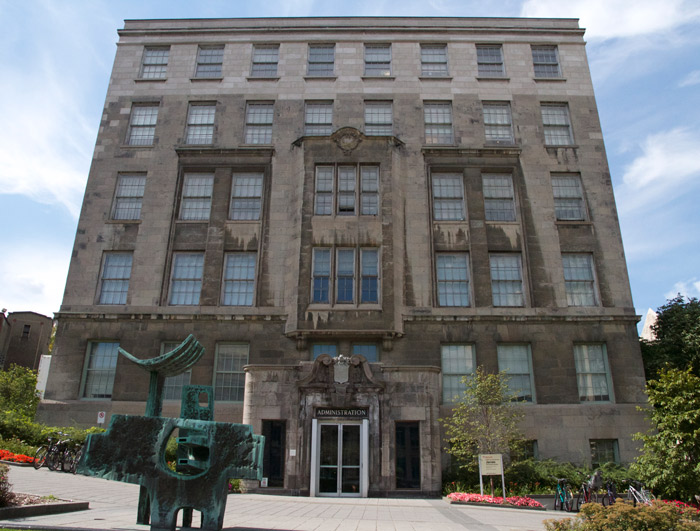On Nov. 10, the McGill Board of Governors (BoG) and Senate held their annual joint meeting to discuss challenges pertaining to the university’s direction and mission in the upcoming year. The discussion was focused on McGill’s sustainability plans and initiatives. Past joint Board-Senate meeting topics include strengthening mental health at McGill (2013) and McGill’s engagement with the external community (2014) . Sustainability was also the focus of the 2007 Board-Senate meeting.
The meeting began with a table display of a few of McGill’s current sustainability initiatives, including the Barbados Field Study Semester and projects funded by the Sustainability Projects Fund, such as the Education Community Living Environment (ECOLE) and Plate Club.
Principal Suzanne Fortier recognized the significance of sustainability efforts from McGill students and faculty in keeping with the university’s mission and Vision 2020 Sustainability Strategy. Vision 2020 aims to establish McGill as a global leader in sustainability through its efforts in five areas: Research, education, connectivity, operations, and governance and administration.
Fortier stated that she believes it is important to include sustainability in all three components of the university’s mission: Teaching, learning, and service to society.
“It is very important that […] in a variety of fields […] we are able to learn about sustainability, teach about sustainability, and also to empower our students to [be sustainable] in their activities, not only while they’re at McGill, but after they leave our university,” Fortier said.
Dean of Science Bruce Lennox addressed the unique challenges of sustainability research, which, unlike other sciences, often lacks a clear end goal or solution.
“We got a man on the moon, and he came back,” Lennox said. “The human genome project, in a small number of years, through basic science development, accomplished [its goal]. But sustainability […] also involves problems […] that don’t have endpoints that are as readily definable as putting someone on the moon. It’s about the integration of science into our society.”
Three McGill professors–Graham MacDonald, Andy Gonzalez, and Elena Bennett, from the Geography, Biology, and Natural Resource Sciences departments, respectively–presented their sustainability research at the World Economic Forum’s Annual Meeting of the New Champions in Tianjin, China in June. MacDonald, Gonzalez, and Bennett presented this research again at the joint meeting on Thursday.
Bennett, an associate professor in the McGill School of Environment, has been researching sustainability success stories in communities around the world in order to learn how their success can be emulated globally.
“By collecting examples of these success stories, which we call ‘bright spots’ or ‘seeds of a good anthropocene,’ by understanding what makes them successful, we can help build better human-environment relationships that stay within planetary boundaries,” Bennett said. “We see our bright spots as pockets of a better future that’s already in place today.”
Attendees were asked to discuss what they consider to be the top opportunities to advance McGill’s sustainability objectives in teaching, research, and operations. They were divided into three groups to focus on immediate, medium-term, and long-term objectives.
Immediate term objectives identified by attendees included curtailing water use by installing more automated water bottle filling stations and implementing a feedback system for people to report areas of wasteful water use.
Proposed medium-term objectives include reducing barriers to introducing new courses and sustainability initiatives at the university, improved communication and accessibility between the Macdonald and Downtown campuses, and mandatory sustainability courses.
Long-term objectives include setting a target date for McGill to become carbon-neutral and achieve energy efficiency, as well as investing to address the sustainability issues presented by the old age of many university buildings.
There is currently no plan for if, how, and when these initiatives will be implemented. The topic of the next join BOG-Senate meeting has yet to be announced.








